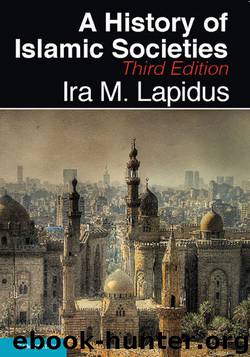A History of Islamic Societies by Ira M. Lapidus

Author:Ira M. Lapidus [Lapidus, Ira M.]
Language: eng
Format: epub
Publisher: Cambridge University Press
Published: 2014-09-30T00:00:00+00:00
European trade, naval power, and empire
These social conditions were amplified by economic and technological development. By the thirteenth and fourteenth centuries, the towns of Italy, Flanders, and the Baltic were already committed to commerce and industry, rather than agriculture, as sources of wealth. Out of these towns came novel techniques for investment, banking, and insurance, and other methods of economic organization and exchange. The pursuit of wealth and sophisticated means to generate it led to a tremendous outward expansion of European city-states in search of exotic luxury products and of new sources of food, fuel, and raw materials for their growing and ambitious populations.
The trading impulse led by stages to a revolution in world commerce and politics. Venice and Genoa had already created extensive networks of colonies and trading posts in the eastern Mediterranean and the Black Sea, where they could purchase spices, drugs, dyes, silk, and other products of the East. When the rise of the Ottoman Empire cut off the Italian city-states from their Eastern sources, Genoa was forced to turn to the western Mediterranean and the Atlantic for its supplies of wool, sugar, alum, silk, cereals, dyes, and spices. The Portuguese undertook the search for a new route to the Indies that would bypass Middle Eastern routes and enable them to bring Eastern products directly to Lisbon. By 1507 they had established bases in the Indian Ocean, reducing commerce in the Red Sea and the Mediterranean. Spanish and Italian explorers discovered new continents. Portugal and Spain conquered empires in the southern seas and the New World and brought home untold wealth.
In the sixteenth century, the great empires vied to dominate the global economy. The Ottomans fought the Habsburgs in Italy, Eastern Europe, and the Mediterranean and the Portuguese in the Indian Ocean. By the late sixteenth century, the Ottomans had consolidated their position in the Balkans and North Africa, but the entry of northern trading and warships into the Mediterranean heralded a major change in the international capitalist economy and a shift of commercial and military power to northern Europe. Holland, England, and France emerged as the dominant forces in world trade. Each of them would create a global commercial empire based on sophisticated trading, advanced gunnery and sailing techniques, and utter ruthlessness.
Although the discovery of new routes to the Orient did not close the traditional Middle Eastern international routes, it created a revolution in the distribution of wealth. As a result, Europe would prosper on the captured gold and silver, spices, and other products of both the New World and the Old. The Baltic and the Atlantic replaced the Mediterranean and the Indian Ocean as the most important centers of world trade. The growth of Atlantic trade meant not only a change of routes but also a change in the nature of the goods being exchanged. Whereas the traditional trade was largely a trade in luxury goods, the new commerce was a trade in agricultural and industrial products (timber, grain, fish, salt, etc.) on a mass
Download
This site does not store any files on its server. We only index and link to content provided by other sites. Please contact the content providers to delete copyright contents if any and email us, we'll remove relevant links or contents immediately.
| Buddhism | Christianity |
| Ethnic & Tribal | General |
| Hinduism | Islam |
| Judaism | New Age, Mythology & Occult |
| Religion, Politics & State |
Cecilia; Or, Memoirs of an Heiress — Volume 1 by Fanny Burney(31332)
Cecilia; Or, Memoirs of an Heiress — Volume 3 by Fanny Burney(30934)
Cecilia; Or, Memoirs of an Heiress — Volume 2 by Fanny Burney(30889)
The Secret History by Donna Tartt(16623)
Sapiens: A Brief History of Humankind by Yuval Noah Harari(13052)
Leonardo da Vinci by Walter Isaacson(11903)
The Radium Girls by Kate Moore(10907)
Sapiens by Yuval Noah Harari(4537)
The Wind in My Hair by Masih Alinejad(4424)
How Democracies Die by Steven Levitsky & Daniel Ziblatt(4398)
Homo Deus: A Brief History of Tomorrow by Yuval Noah Harari(4279)
Endurance: Shackleton's Incredible Voyage by Alfred Lansing(3844)
The Silk Roads by Peter Frankopan(3760)
Man's Search for Meaning by Viktor Frankl(3631)
Millionaire: The Philanderer, Gambler, and Duelist Who Invented Modern Finance by Janet Gleeson(3569)
The Rape of Nanking by Iris Chang(3516)
Hitler in Los Angeles by Steven J. Ross(3437)
The Motorcycle Diaries by Ernesto Che Guevara(3332)
Joan of Arc by Mary Gordon(3258)
